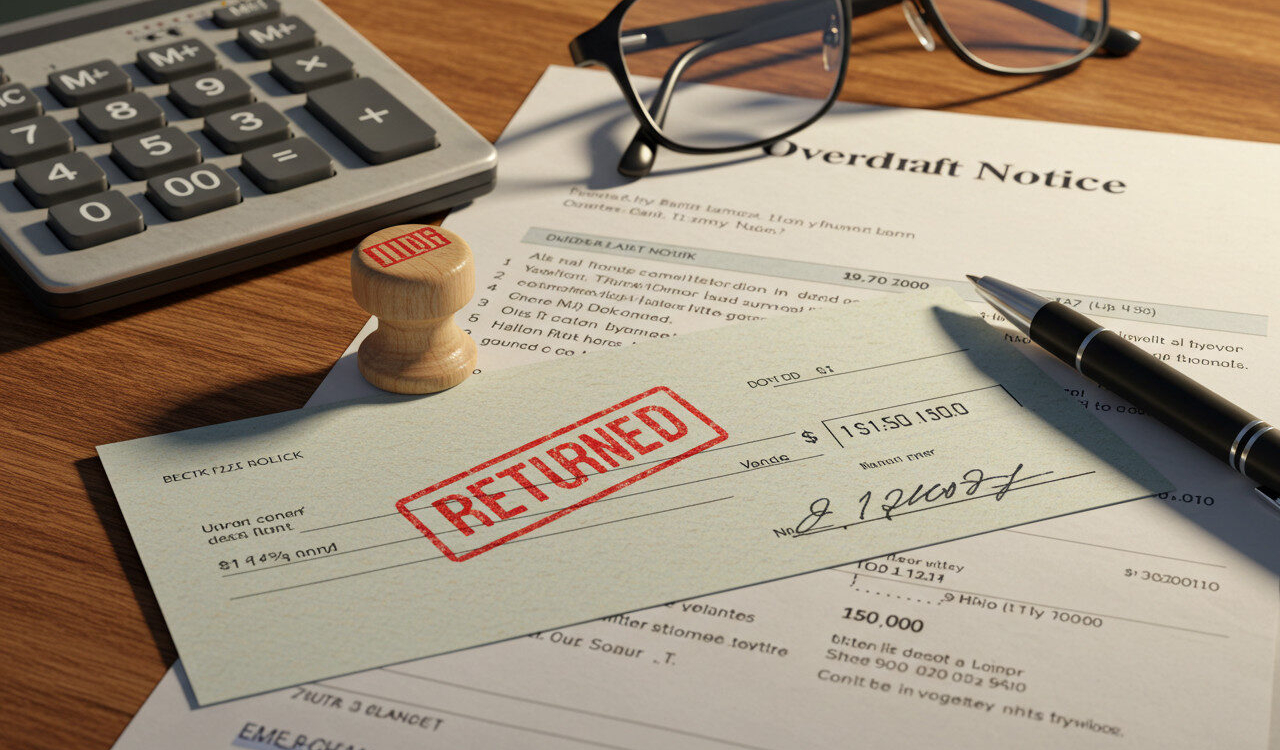Introduction
Returned check fees can disrupt your financial plans and add unnecessary costs. This formatted guide explains what these fees are, how they work, and practical ways to avoid them.
What Is a Returned Check Fee
A returned check fee is a charge from a bank or credit union when a check cannot be processed due to insufficient funds. The fee covers the administrative costs of handling bounced checks. Most banks charge between $20 and $70 per returned check, and you may incur additional fees such as overdraft or late charges. Bounced checks can result in legal consequences or negatively impact your credit. Using overdraft protection and regularly checking your balance can help you avoid these fees.
Returned Check Fees Explained
When you write a check and it cannot be processed, it’s called a returned or bounced check. Banks usually charge a fee in these cases to cover the processing of the failed transaction. These events can happen for various reasons, but the most common one is insufficient funds in your account. Other reasons include a closed account or errors in the check’s details.
Returned check fees can add up quickly and disrupt your financial plans. Understanding how and why these fees occur can help you avoid them and keep your finances in excellent shape.
Definition of a Returned Check Fee
A returned check fee (also known as a bounced check fee) is a penalty charged when a check cannot be processed because there are not enough funds in the account. This fee compensates the bank for its efforts in managing the failed transaction.
In some cases, returned checks also cause problems for the recipient, especially if their bank imposes additional fees.
Common Reasons Checks Are Returned
Here are the most common reasons why checks are returned:
- Insufficient funds: Your account does not have enough money to cover the amount written on the check.
- Closed or frozen accounts: The check originates from an inactive account.
- Incorrect check details: Mistakes such as an incorrect date, wrong amount, or missing signature can cause rejection.
- Stale-dated checks: If a check is more than six months old, the bank may refuse to process it.
How Much Does a Returned Check Fee Cost
The cost of a returned check fee varies depending on your financial institution and the specific circumstances. Most banks charge between $20 and $70. In some cases, you may also owe additional fees to the check recipient or face overdraft penalties.
Typical Fee Ranges in the United States
| Type of Institution | Fee Range ($) | Notes |
|---|---|---|
| Large Banks (e.g., Wells Fargo) | $35–$70 | May also charge overdraft fees of up to $35 |
| Credit Unions | $20–$35 | Generally lower fees than major banks |
| Small Service Providers | $25–$40 | May include extra fees if the payment fails |
These fees vary based on the institution’s policies and local regulations. Always check your bank’s fee schedule for specific information.
Factors That Influence the Fee Amount
Several factors determine how much a returned check fee will cost:
- State regulations
- Type of institution
- Account history
Reading your bank’s terms and conditions can help you understand potential charges and avoid unexpected costs.
Impact on Your Finances and Bank Account
When a check is returned, it may trigger additional fees such as
- Overdraft fees
- Late payment fees
- Merchant penalties
Repeated issues may prevent you from opening new accounts or accessing credit. For businesses, returned checks can disrupt operations and harm your reputation.
Potential Effects on Credit and Legal Standing
Although banks don’t typically report bounced checks to credit bureaus, unpaid debts sent to collections can lower your credit score.
In some states, repeatedly writing fraudulent checks may be considered a legal offense. Consequences can range from civil fines to criminal charges.
How to Avoid Returned Check Fees
Avoiding returned check fees is easy with a few proactive steps. Monitoring your balance, using electronic payments, and enabling alerts are smart habits that can prevent costly errors.
What You’ll Need to Prevent Returned Check Fees
Prepare the following tools to help you stay on top of your finances:
- Active checking account
- Direct deposit
- Electronic payment options
- Line of credit
Ways to Prevent Returned Check Fees
Follow these steps to reduce the risk of returned check fees:
- Keep enough money in your account: Check your balance frequently.
- Verify all payment details. Ensure correct dates, amounts, and signatures.
- Set up alerts: Get notifications for low balances.
- Use overdraft protection: Link your account to savings or a credit line.
- Recommend secure payment methods: Encourage clients to use digital payments.
Major Highlights
- Returned check fees typically range from $20 to $70
- Common causes include insufficient funds and check errors
- Fees can trigger overdraft charges and harm your financial standing
- Overdraft protection and account alerts help prevent fees
- Legal and credit consequences may arise from frequent bounced checks
Frequently Asked Questions
What should I do if I receive a returned check fee?
Contact your bank to understand the reason and request a waiver if it’s your first offense.
Can I get a returned check fee waived?
Yes, many banks may offer a one-time waiver for customers with excellent account history.
Could you please clarify who is responsible for the fee associated with a bounced check?
The person who wrote the check is typically responsible for the fee.
Are returned check fees regulated?
Yes, many states regulate these fees. Check your state’s laws or bank policy for specifics.
Updated by Albert Fang
Source Citation References:
+ Inspo
There are no additional citations or references to note for this article at this time.
